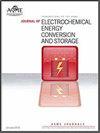基于改进电热耦合模型和 ANFIS 的锂离子电池内部温度估算
IF 1.9
4区 工程技术
Q3 ELECTROCHEMISTRY
Journal of Electrochemical Energy Conversion and Storage
Pub Date : 2023-12-28
DOI:10.1115/1.4064353
引用次数: 0
摘要
准确估算锂离子电池的内部温度对于开发合适的电池热管理系统、保障电池健康安全运行以及提高电池性能具有重要作用。为了准确估算电池内部温度,本文提出了一种基于改进的电热耦合模型和自适应网络模糊推理系统(ANFIS)的锂离子电池内部温度估算方法。首先,提出了电学模型的参数化方法,并建立了参数受温度和 SOC 影响的电学模型。其次,为了克服锂离子电池复杂的非线性建模问题,建立了 ANFIS 热模型。然后,结合所提出的电学模型和 ANFIS 热学模型,建立了改进的锂离子电池电热耦合模型,从而提高了电池内部温度估算的准确性。最后,通过仿真和实验验证了所提方法的有效性。本文章由计算机程序翻译,如有差异,请以英文原文为准。
Internal temperature estimation of lithium-ion battery based on improved electro-thermal coupling model and ANFIS
Accurate estimation of the internal temperature of lithium-ion batteries plays an important role in the development of a suitable battery thermal management system, safeguarding the healthy and safe operation of batteries, and improving battery performance. In order to accurately estimate the internal temperature of the battery, this paper proposes a method for estimating the internal temperature of lithium-ion batteries based on an improved electro-thermal coupling model and an Adaptive Network-based Fuzzy Inference System (ANFIS). First, a parameterization method of the electrical model is proposed, and an electrical model whose parameters are affected by temperature and SOC is established. Second, to overcome the complex nonlinear modeling problem of lithium-ion batteries, the ANFIS thermal model is established. Then, an improved electro-thermal coupling model for lithium-ion batteries is established by combining the proposed electrical model and the ANFIS thermal model to improve the accuracy of estimating the internal temperature of the battery. Finally, the effectiveness of the proposed method is verified by simulation and experiment.
求助全文
通过发布文献求助,成功后即可免费获取论文全文。
去求助
来源期刊

Journal of Electrochemical Energy Conversion and Storage
Engineering-Mechanics of Materials
CiteScore
4.90
自引率
4.00%
发文量
69
期刊介绍:
The Journal of Electrochemical Energy Conversion and Storage focuses on processes, components, devices and systems that store and convert electrical and chemical energy. This journal publishes peer-reviewed archival scholarly articles, research papers, technical briefs, review articles, perspective articles, and special volumes. Specific areas of interest include electrochemical engineering, electrocatalysis, novel materials, analysis and design of components, devices, and systems, balance of plant, novel numerical and analytical simulations, advanced materials characterization, innovative material synthesis and manufacturing methods, thermal management, reliability, durability, and damage tolerance.
 求助内容:
求助内容: 应助结果提醒方式:
应助结果提醒方式:


